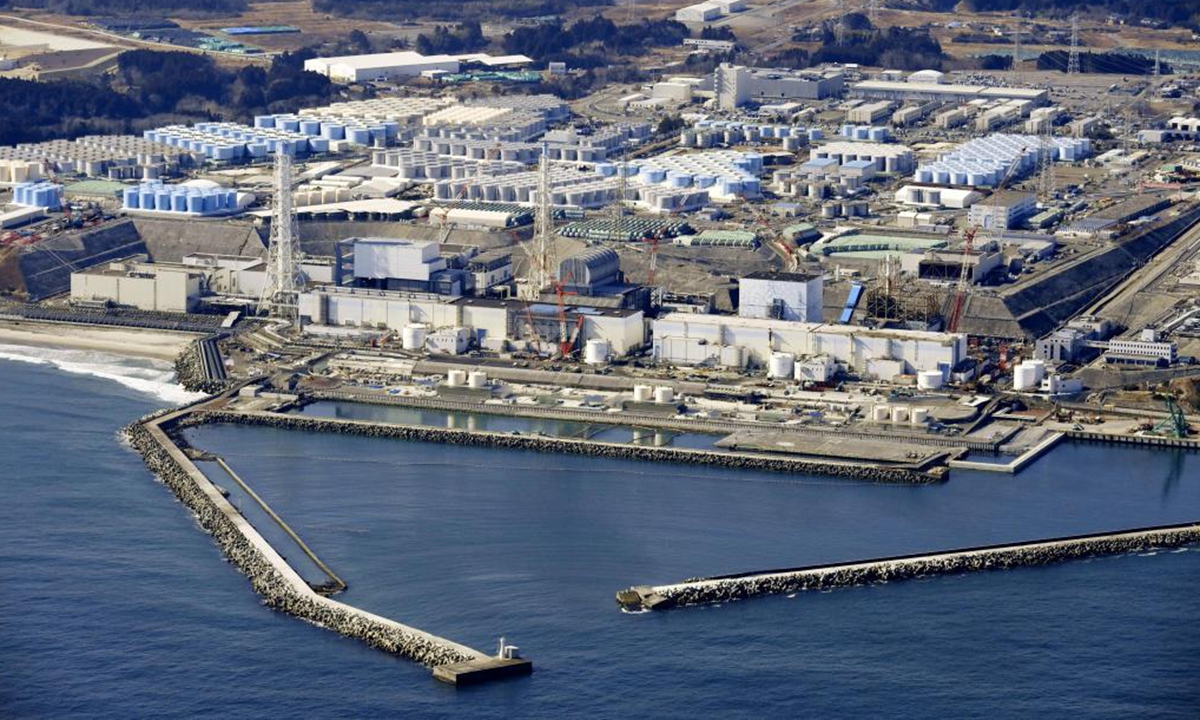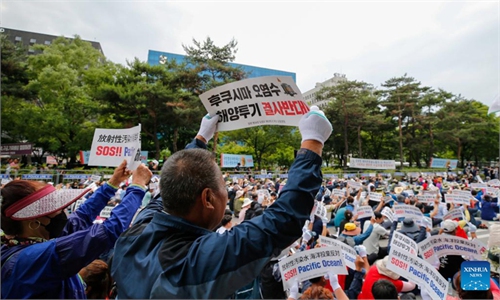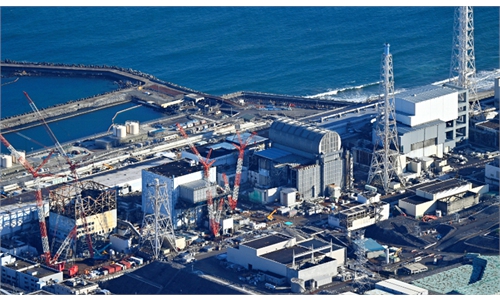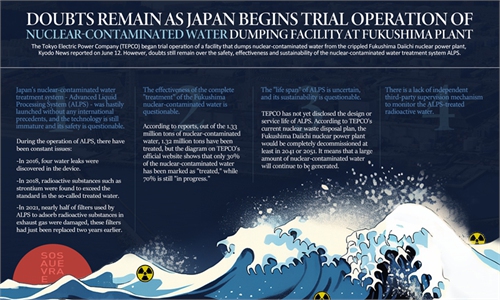Chinese expert of IAEA working group disappointed over hastily released IAEA report on Fukushima: It was released without sufficient consultation with the experts

Tanks at the crippled Fukushima nuclear power plant store nuclear-contaminated wastewater. Photo: Xinhua
A top Chinese expert on nuclear safety expressed his disappointment after the International Atomic Energy Agency (IAEA) hastily released the comprehensive assessment report on the dump plan of nuclear-contaminated wastewater of Japan's Fukushima Daiichi Nuclear Power Plant.
Liu Senlin, an expert with the China Institute of Atomic Energy, who participated in the IAEA's technical working group for the assessment, told the Global Times on Thursday that the report, released in the name of the IAEA director general, was released without sufficient consultation with the experts in the technical working group.
He believes that the report released by the IAEA does not represent the IAEA's recognition of the legitimacy of Japan's decision to dump the treated wastewater into the ocean, nor does it represent the IAEA's approval or authorization of Japan's dump of nuclear-contaminated wastewater.
The report, titled "IAEA Comprehensive Report On The Safety Review Of The Alps-Treated Water At The Fukushima Daiichi Nuclear Power Station," was release on Wednesday, announcing that Japan's dump plan meets IAEA's safety standards. The report has caused backlash in some countries which will be impacted by the dump after it was released.
China, once again, urges Japan to stop forcefully promoting its plan to discharge nuclear contaminated wastewater, display a responsible attitude toward the marine environment and human health, and not impose unpredictable risks on the international community, Wang Wenbin, the spokesperson of the Chinese Foreign Ministry, said at the routine press conference on Thursday.
He noted that Japan is more concerned with how to reduce economic costs than how to protect the marine ecological environment and human health. Japan did not fully consult with the international community, most especially with relevant stakeholders. Moreover, discharging wastewater into the ocean is a risky venture without precedent and full of uncertainties.
"This practice of prioritizing money over human health will undoubtedly face opposition from the international community," Wang said.
Liu mentioned that the report was released in the name of the IAEA Director General Rafael Mariano Grossi. Although the IAEA Secretariat had sought opinions of the technical working group's experts on the draft report before its release, the time given to the experts was very limited, and their opinions were only for reference, with the decision on whether to adopt them being made by the IAEA Secretariat.
After receiving feedback, the IAEA Secretariat did not initiate a discussion or reached a consensus with the experts on the modification of the report or the adoption of the opinions before the hasty release of the report, according to Liu.
Liu pointed out that the IAEA conducted the assessment and evaluation at the request of the Japanese government after it unilaterally made the decision to dump the nuclear-contaminated wastewater. The IAEA's assessment was limited to the discharge plan for the contaminated-wastewater treated by Japan, the regulatory procedures, and activities of the Japanese government, and whether the implementation of the plan by the Tokyo Electric Power Company (TEPCO) complied with IAEA safety standards.
"However, it did not include other possible disposal options beyond discharge, nor did it address the effectiveness and long-term reliability of the water purification system," he noted.
Additionally, the IAEA's assessment was of an international peer review and was mainly based on the data and information provided by the Japanese side for assessment and the seeking of recommendations.
Liu introduced that during the last two years of evaluation tasks, experts from various parties in the technical working group extensively and deeply discussed technical issues related to the Japanese government's responsibilities and functions in the discharge of treated contaminated water, key principles and safety objectives, authorization procedures, source characterization, safety issues of the discharge system and process, evaluation of radiation environmental impact, source monitoring and environmental monitoring plans, occupational radiation protection, public consultation, and involvement of relevant parties. "There were both consensuses and differences of opinion, and a unanimous agreement was not reached."
On the one hand, the IAEA's review and evaluation effectively raised the technical threshold and regulatory requirements for Japan's discharge of nuclear-contaminated water; on the other hand, there were significant limitations, such as not addressing the international community's concerns over the legitimacy of Japan's decision to discharge, and not having sufficient discussions and arrangements for subsequent review and assessment tasks and long-term monitoring plans.
The IAEA plays the role of an assessor, rather than a decision-maker, in the issue of the disposal of nuclear-contaminated wastewater in Fukushima, Japan, an anonymous Chinese nuclear safety expert with official ties told the Global Times on Thursday.
"From the perspective of the IAEA, its release of the comprehensive assessment report stating that Japan's plan for discharging nuclear-contaminated wastewater 'meets international safety standards' can only be understood as the plan being feasible. However, feasibility does not imply that the plan is the optimal solution, and there are still many questions that Japan has not answered," he noted.
When Japan requested for IAEA assessment of its disposal plans, it did not submit all feasible options for evaluation. Instead, it submitted the discharge plan that was most favorable to its interests. This assessment itself has limitations and biases, the expert said.
The expert further explained that in reality, the IAEA's assessment report cannot serve as a "shield" and "pass" for Japan's discharge plan. Although it is deemed to "meet international safety standards," there are still risks involved.
The radiation safety standards established by the IAEA set the public dose limit at 1 millisievert per year. However, even exposure below 1 millisievert still carries the risk of radiation effects. "It is similar to a speed limit of 100 kilometers per hour on a highway, which does not guarantee absolute safety as long as the speed remains below 100," he said.
Liu noted that in addition to the radiological impact, the effects of the discharge involve many aspects such as social, psychological, economic, and the marine ecology. The predictive assessment currently being conducted by the Japanese side only focuses on radiological impact but does not provide a comprehensive assessment.
The relevant conclusions of the report only reflect that Japan's current overall measures for treating and discharging the contaminated water are in line with IAEA safety standards, but they do not imply that they will continue to meet IAEA safety standards in the next 30 years and beyond, Liu said.
He noted that the report explicitly states that the IAEA will continue to conduct fair and objective reviews and assessments during the implementation phase of Japan's discharge plan and will carry out independent sampling and monitoring.
Currently, the immediate priority for the IAEA is to expedite the establishment of an independent and effective long-term international monitoring mechanism to ensure effective supervision and continuous monitoring of Japan's measures and regulatory activities regarding the dump of nuclear-contaminated wastewater, in order to enhance transparency and gain the trust of the international community, he said.
In this process, the reasonable concerns and participation of the neighboring countries of Japan, Pacific island countries, and other relevant countries should be fully taken into account. The independence of on-site supervision and sample monitoring by the IAEA should be ensured. Judgments should not be solely based on the data and information provided by Japan, but should involve independent sampling and monitoring conducted by the IAEA's own laboratories and independent third-party laboratories, Liu noted.
"From the perspective of the IAEA's assessment results, its position clearly leans more toward the Japanese government," said the anonymous expert.
Firstly, the IAEA itself is also eager to resolve the issue of Fukushima's nuclear-contaminated wastewater as soon as possible because one of its mandates is to promote the peaceful use of nuclear energy globally, he said.
The other reason is that Japan has significant influence within the IAEA. From the information available to us, there are many Japanese nationals serving in the IAEA, and this trend has continued in the past decade, according to the expert.
"The Japanese government is active in this issue and financially supports sending experts or advisors to serve in or provide services to the IAEA. From the perspective of the IAEA, enjoying free professional services is certainly welcomed. From Japan's perspective, it expands its influence and discourse power within the IAEA through this approach," he said.





